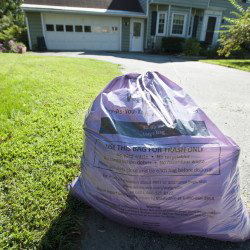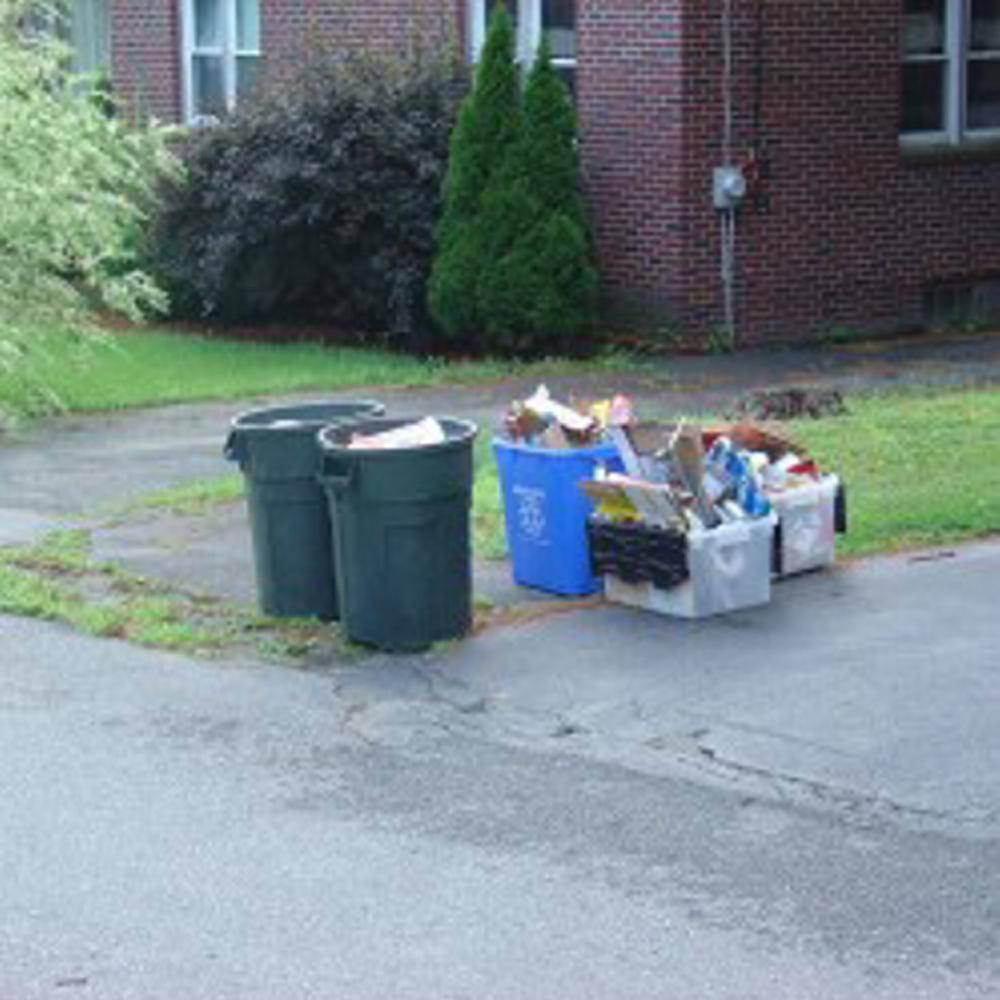WATERVILLE — Councilors Tuesday night will consider changing the city’s solid waste ordinance to reflect the new pay-as-you-throw trash collection and curbside recycling programs. They also will consider voting to approve borrowing $4.1 million for capital improvement projects.
The meeting will be at 7 p.m. in the council chambers at The Center downtown and will be preceded by a workshop session at 6 p.m. to discuss capital improvement needs.
While the new curbside recycling program started in July and the pay-as-you-throw trash collection system started in September, the city is just now considering making changes to the solid waste ordinance to reflect those programs. The ordinance currently states that residents may use any two-handled container. PAYT requires residents to buy special trash bags.
“I see that as a housekeeping measure, something we should have done five months ago,” City Manager Michael Roy said Monday. “Our current ordinance never was changed when the council approved going to the new system. All of a sudden we remembered, oh, wait a minute, our current ordinance needs to be updated.”
In approving pay-as-you-throw, councilors did not vote on it as a separate item; they voted on a $37.2 million municipal and school budget that included pay-as-you-throw.
As part of that vote, councilors agreed to conduct a referendum in June 2015 to ask residents if they want to keep pay-as-you-throw or repeal it.
Council Chairman Fred Stubbert, D-Ward 1, and Karen Rancourt-Thomas, D-Ward 7, voted against that budget because they opposed pay-as-you-throw.
Stubbert said that pay-as-you-throw should have been discussed more at the council level. He said a lot of residents were opposed to pay-as-you-throw and the council should have voted on it separately from the budget.
He said the solid waste ordinance should have been changed when pay-as-you-throw was instituted. Pay-as-you-throw requires people to buy special purple plastic bags for their trash and place them at the curb. Stubbert says that he believes that, since the ordinance was never changed, the city remained obligated to pick up trash at the curb, whether it was in purple bags or regular trash bags.
Councilors voted to institute pay-as-you-throw and have authority to repeal it. They also may reject the proposed ordinance changes.
“I don’t think they will, but that’s always a possibility,” he said.
Voting to reject the ordinance changes would not effectively put a stop to pay-as-you-throw, but if someone challenges the issue, the trash collection system could be repealed, according to Stubbert.
“I still have lots of reservations about pay-as-you-throw,” Stubbert said. “I’ve been going around the city on a regular basis, and there is trash all over the place, despite what you hear.”
CREDIT ON THE LINE
On the borrowing issue, councilors at their last meeting Dec. 2 took a first vote to approve borrowing $4.1 million dollars next year to help fund capital improvement projects, including a $305,000 property revaluation and $290,000 for an airport runway reconstruction.
The council could take second and third and final votes Tuesday, or it could choose to take no vote and wait until next year to tackle the issue.
Stubbert and Rancourt-Thomas abstained from voting on Dec. 2; the other five councilors approved the borrowing.
Roy said Monday that the city has some very important capital improvement needs that would be difficult to address in the regular annual operating budget.
“So I think the question is, how many of those needs do we try to address in this next borrowing?” Roy said. “Is it just a single year’s worth, or do we try to plan for two or three years, especially on the public works side and roads?”
Meanwhile, the city’s total municipal and school debt is about $25 million, and the city’s payment on that debt in this current year is $2.1 million, according to Finance Director Chuck Calkins.
The city borrowed in 2002, 2005, 2011 and 2013, he said, with the 2002 loan refinanced in 2011.
The bonding was for projects that include construction of the police station, renovations to Waterville Public Library and Waterville Senior High School, road improvements and equipment purchases.
The city’s accumulated surplus from funds raised but not spent in prior fiscal years is about $4.7 million, which is about 13 percent of what the city spent in the 2013-14 budget of $36 million. The city’s fiscal year ended June 30.
The current budget calls for using $1.4 million of the surplus in the 2014-15 budget. Some surplus funds are budgeted to be used by the schools as well, according to Calkins.
The city has a policy that aims to run a surplus of at least 12 percent of what the city spent in its most recent budget.
Stubbert says spending in the city is a problem.
“One of the things we’re looking at is hiring an economic development director in the city because we’ve got to broaden our tax base,” he said. “We’re going to run out of surplus, and right now surplus is the only thing that is keeping us from significant tax increases of two, three and maybe four mills ($1 per $1,000 worth of valuation). We’ve taken between $800,000 and $1.5 million out of surplus every year and $1.5 million is three mills.”
Amy Calder — 861-9247
Twitter: @AmyCalder17
Send questions/comments to the editors.





Success. Please wait for the page to reload. If the page does not reload within 5 seconds, please refresh the page.
Enter your email and password to access comments.
Hi, to comment on stories you must . This profile is in addition to your subscription and website login.
Already have a commenting profile? .
Invalid username/password.
Please check your email to confirm and complete your registration.
Only subscribers are eligible to post comments. Please subscribe or login first for digital access. Here’s why.
Use the form below to reset your password. When you've submitted your account email, we will send an email with a reset code.